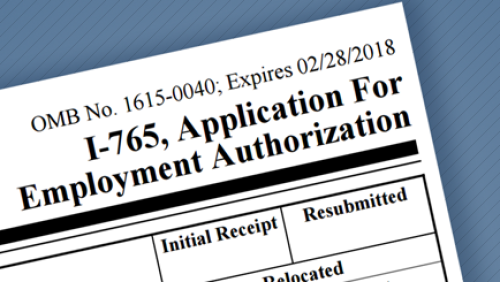The complaint, co-filed with the Northwest Immigrants Rights Project, Gibbs Houston Pauw, and the Massachusetts Law Reform Institute, was submitted on behalf of a class of untold numbers of asylum applicants wrongfully denied work authorization due to unlawful agency policies and practices. The settlement agreed to by the parties was approved by the Court and applies to the entire class.
In their amended complaint, Plaintiffs and the class challenge as unlawful five of defendants’ policies and practices which either prevent or seriously delay the receipt of an EAD by asylum applicants while their asylum applications are pending. Plaintiffs allege defendants’ policies and practices violate the U.S. Constitution, the Immigration and Nationality Act (INA), the governing regulations, and the Administrative Procedure Act (APA). Soon after filing the complaint, Plaintiffs moved for class certification and for a protective order to prevent public release of the named plaintiffs’ names and other identifying information. The Court granted the protective order, but delayed ruling on the class certification motion.
In July, 2012, the Court granted the parties’ request to enter into the Court’s mediation program and stayed proceedings while mediation took place. The parties participated in continuing mediation until April, 2013, when they reached a comprehensive settlement agreement, including agreement on class certification. Under the settlement, USCIS and EOIR will make several important changes to the method by which USCIS and EOIR calculate the 180-day waiting period for EAD eligibility for asylum applicants (often referred to as the “asylum clock”). The Court issued an order that approved the agreement on a preliminary basis and directed the parties to notify class members of its terms. The Notice to Class Members describes the ABT class, the benefits provided to class members, and the process for claiming that the settlement was not properly implemented in a case. This notice, as well as a “Frequently Asked Questions” about the settlement, can be found below. The Court also scheduled a fairness hearing for September, 2013.
On September 20, 2013, the District Court for the Western District of Washington held a fairness hearing and preliminarily approved the parties’ settlement agreement. Prior to the hearing, the parties addressed the sole response received to the Class Notice by slightly revising the agreement. The Court ordered an additional 30-day notice period for class members to review the revised settlement agreement and supplemental class notice regarding attorney’s fees.
On October 30, following the 30-day notice period, the parties filed a joint proposed Order for final approval of the settlement agreement. Additionally, the government filed an unopposed motion to extend the implementation date of the settlement from November 8 until December 3 due to the government shutdown in October. On November 4, the District Court issued an Order approving the revised settlement agreement and also granted the government’s motion to extend implementation of the settlement until December 3, 2013.


